MercoPress. South Atlantic News Agency
Tag: Argentina crisis
-
Tuesday, June 25th 2019 - 09:51 UTC
The Economist: “In Argentina, the IMF has been neither toxic nor triumphant”

“What good is it to throw a man ten feet of rope if he is drowning in 20 feet of water?” asked Kenneth Rogoff, former chief economist of the IMF, to The Economist 15 years ago. His question still bothers the institution he used to advise.
-
Friday, June 14th 2019 - 09:40 UTC
Argentine inflation 3.1% in May and 57.3% in twelve months
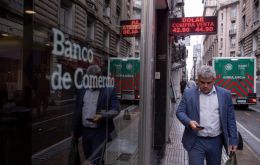
Argentine consumer prices rose 3.1% in May, the government’s official statistics agency said on Thursday. Accumulated inflation in the 12 months through May came to 57.3%, and year-to-date inflation was 19.2%, according to the National Census and Statistics Institute, known by its acronym, INDEC.
-
Thursday, June 6th 2019 - 08:41 UTC
Argentine construction industry contracts 7.5% in April and 10.3% in four months

The construction industry in Argentina contracted 7.5% last April, the eighth consecutive month, with an overall drop of 10.3% in the first four months of the year. According to the country's stats office Indec, the Indicator of Construction Activity, during April fell 0.3% from March.
-
Tuesday, April 30th 2019 - 09:55 UTC
Major strike and march announced for this Tuesday in Argentina, but unions remain divided
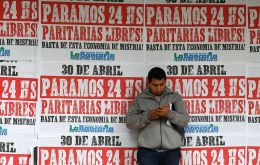
A national strike will halt much of shale-rich Argentina's economy on Tuesday amid growing investor concern that market-oriented president Mauricio Macri will lose a bid for re-election in October, swinging Argentina back toward state intervention.
-
Thursday, April 25th 2019 - 09:59 UTC
Argentine government admits that political uncertainty is behind the current collapse of economic indexes
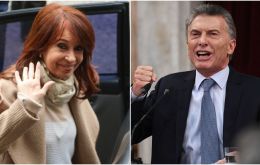
Argentine economy Minister Nicolás Dujovne stated that political uncertainty ahead of the upcoming presidential election this October is the main factor for increases in Argentina's country risk and instability on the exchange markets.
-
Wednesday, April 17th 2019 - 09:58 UTC
Argentina's inflation 54.7% in 12-months; more monetary “contraction measures” and support from IMF
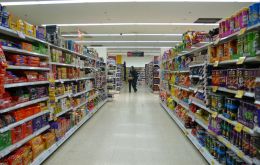
Argentina's inflation rate accelerated for the third straight month in March, the government statistics agency said on Tuesday, prompting the central bank to unveil fresh measures to temper raging inflation and protect the embattled peso currency.
-
Tuesday, April 9th 2019 - 09:59 UTC
Argentina's Peso takes a rest after a hectic week but the country risk shoots to its highest this year
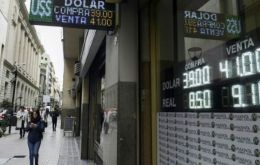
Latin American stocks were flat on Monday, partly subdued by delays in important pension reform in Brazil, while currencies in the region rose against a weak dollar but Argentina's peso hovered around record-low levels on political uncertainty and the highest country risk so far this year.
-
Saturday, April 6th 2019 - 09:33 UTC
IMF releases US$10.8 billion to Argentina and insists on fiscal prudence

The Executive Board of the International Monetary Fund (IMF) completed on Friday the third review of Argentina’s economic performance under the 36-month Stand-By Arrangement (SBA) that was approved on June 20, 2018. The completion of the review allows the authorities to draw the equivalent of SDR 7.8 billion (about US$10.8 billion), bringing total purchases since June 2018 to SDR 28.01371 billion (about US$38.9 billion).
-
Friday, April 5th 2019 - 09:33 UTC
Brazil automakers confident of domestic market despite collapse of exports to Argentina
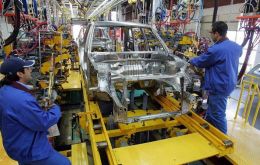
Automobile production in Brazil fell 0.6% in the first quarter of 2019 compared to the same period last year, the national automakers’ association said on Thursday, as an economic crisis in Argentina continued to weigh on output.
-
Friday, April 5th 2019 - 09:26 UTC
Argentines take to the streets under pouring rain to protest Macri’s austerity

Argentine unions, small business owners and activists took to the rain-drenched streets of Buenos Aires on Thursday to protest against austerity measures under President Mauricio Macri, which they blame for amplifying worker hardships and sapping growth.
